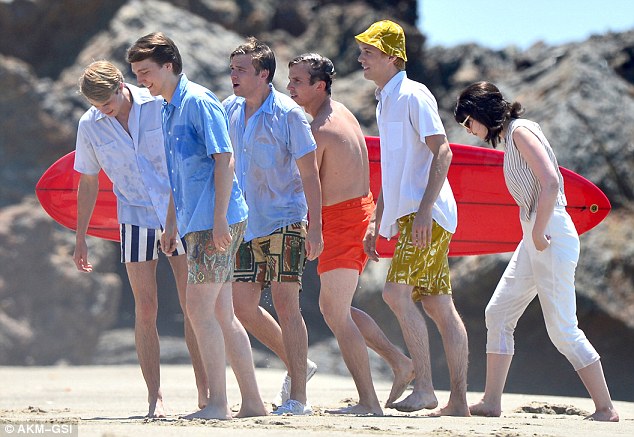Love and Mercy – Film Review
Director: Bill Pohlad
Starring: John Cusack, Elizabeth Banks, Paul Dano and Paul Giamatti
Release Date: 10 July
It will come as no surprise to anyone with even a passing knowledge of Beach Boys lore that Love & Mercy features a scene in which Mike Love berates his bandmate Brian Wilson from veering unduly from the band’s simple surf-rock formula. The clash of Love’s adherence to bubble-gum hits and his cousin’s wild innovation is such a prominent part of the band’s mythology that it was inevitable it would be depicted in any biopic on Brian Wilson.

But beyond its obvious place in the story of Wilson’s life and music, the scene also acts as a neat meta-commentary on the film itself. The ‘musician biopic’ subgenre may have accumulated its fair share of awards over the years, but therein lies the problem; nothing breeds conservatism like success. A history of Oscar winners breeds attempts at Oscar bait, and thus the lives of wonderfully creative artists are fit into disappointingly conventional films.
Conscious of paying tribute to a man who opted to make ‘pocket symphonies to God’ rather than churn out conventional hits, director Bill Pohlad, like his subject, has eschewed formula for something more unconventional.
Love & Mercy flits between the 1960s where a young Brian Wilson (Paul Dana) withdrawing from the band’s touring schedule to explore the possibilities of the studio, and the late 1980s where an older Brian (John Cussack) is an over-medicated burnout in thrall to Paul Giamatti’s obsequious Dr Eugene Landy.
This structure gives the film an expansive air, though it is ultimately the story of Brian’s breakdown and recovery through Melinda Ledbetter (Elizabeth Banks), the feeling remains that the film is opting to tell this story from Brian’s life rather than pretend that Brian’s life was this story.

Cinematographer Robert D. Yeoman (best known for his work on Wes Anderson’s oeuvre) delineates wonderfully between these two eras. The 1960s scenes are rife with shaky cameras and grainy footage that give the impression of a fly-on-the-wall documentary on the Beach Boys, while Brian’s 1980s beach home is a stark and sterile reflection of the songwriter’s repressed life under Landy’s watch.
Aurally too, Love & Mercy is a delight. Not only are we treated to deftly employed cuts from the Beach Boy’s back catalogue (the pinnacle of which is a superbly surreal scene soundtracked by ‘Til I Die’), but the depictions of the auditory hallucinations which plagued Wilson after his experimentation with LSD are wonderfully unsettling.
And while the film eulogises Wilson’s genius (a little too heavy-handedly at certain points), it never glamorises him. Paul Dana is charmingly vulnerable, but over-sensitive to criticism of his own work while lacking almost any sensitivity over his bandmates’ growing feelings of superfluousness.
Meanwhile, John Cussack is lovable, but largely devoid of basic social skills and utterly helpless in taking control of his own life. Similarly, Melinda manages to be more than a muse. She’s compassionate and brave in her efforts to free Brian from Landy’s clutches, but at times succumbs to bafflement and frustration in a way that seems strikingly human.

Eugene Landy, though portrayed brilliantly by Giamatti, is depicted with less nuance. He is the unabashed villain of the piece; narcissistic, manipulative and prone to fits of rage. Ultimately though, Landy makes up in style for what he lacks in subtlety; Giamatti is never less than captivating as a bully who exploits Wilson, but seems utterly convinced of his ability to help him.
Wilson family patriarch Murry is similarly villainous in his attempts to undermine and control his son, but while his inferiority complex underpins his actions neatly, the brevity of his appearances leaves him often reduced to functioning as a plot point rather than a character (a more glaring example of trite characterisations are two hippies whose only purpose seems to be to give Brian drugs and encourage his artistic hubris in the most ham-fisted ways possible).
Mike Love fares better in this regard; it would have been easy to portray him as a mere hurdle for Wilson’s artistic vision to overcome, but the film opts to highlight the complexity of their relationship. Love may be a know-it-all square, but his frustrations over his cousin’s anally retentive studio micro-management and neglect of his bandmates seem wholly understandable. When the two briefly put their differences aside to write ‘Good Vibrations,’ it’s an affectingly understated scene that feels well earned.

Occasionally undermined by heavy-handed dialogue (struggling with his bandmates’ reservations over his creative direction Brian beckons them to join him in the swimming pool, only to be told “We’re too shallow for the deep end”), Love & Mercy ultimately succeeds as a Brian Wilson story rather than the Brian Wilson story.
Compared to Landy and Ledbetter, we see little of Brian’s first wife, Marilyn, or of his relationship with his brothers, but what we do see is enough to hint at more. Similarly, the Beach Boy’s creative and commercial peak is depicted vividly but efficiently; the film resists the temptation to become a 60s theme park (there are no gratuitous cameos from Paul McCartney or onetime Denis Wilson associate, Charles Manson).
The film is a pocket symphony, rather than a sweeping epic, and succeeds marvellously because of this.
Score: 4/5
Written by Colm Kearns
